Crafted Connections: 25 Engaging Follow-up Letter Templates for Job Applications
Welcome to our comprehensive collection of resources on Follow-up Letters for Job Applications! In today’s competitive job market, it is essential to go the extra mile in your job search, and follow-up letters are a powerful tool to help you stand out and make a lasting impression on potential employers. Our website offers not only a variety of templates but also valuable insights, tips, and strategies to personalize and optimize your follow-up letters. Whether you’re expressing gratitude, seeking updates, or showcasing additional qualifications, our resources will guide you in crafting effective follow-up letters that leave a positive impact. We are here to support you in your job search journey and help you maximize your chances of success through thoughtful and impactful follow-up communication.
Communication Etiquette
When it comes to professional communication etiquette in follow-up letters, it’s important to maintain a high standard of professionalism and convey your message effectively. Start by using formal and courteous language throughout your letter, addressing the recipient respectfully. Maintain a polite and positive tone, expressing gratitude for the opportunity and showcasing your enthusiasm for the position. Keep your sentences concise and clear, avoiding jargon or overly technical language that may confuse the reader. Additionally, pay attention to the formatting of your follow-up letter. Use a professional email or letter format, including a proper salutation and closing, and ensure that your letter is well-structured with paragraphs and bullet points if needed. Finally, proofread your letter carefully to eliminate any grammar or spelling errors and ensure your message comes across as polished and professional. By following these communication etiquette guidelines, you can leave a positive impression and demonstrate your professionalism and attention to detail.
Personalization Tips
- Address the recipient by name: Use the recipient’s name instead of generic greetings like “Dear Hiring Manager” to create a more personalized connection from the start.
- Reference specific details: Mention specific details from previous interactions or the job application process to demonstrate your attentiveness and genuine interest in the opportunity.
- Connect your experiences to the company: Highlight how your skills, experiences, or accomplishments align with the company’s mission, values, or recent developments. Show how you can contribute to their specific goals or challenges.
- Customize the tone: Adapt the tone of your follow-up letter to match the company culture and the nature of your previous interactions. If the company has a more formal culture, maintain a professional tone. If your interactions were more casual, you can adopt a slightly more relaxed tone.
- Tailor content to individual recipients: If you are sending follow-up letters to multiple individuals within the same company, customize each letter to address their specific roles, responsibilities, or areas of expertise. Show that you have done your research and understand their contributions to the organization.
- Highlight shared connections or interests: If you have any shared connections or common interests with the recipient, mention them briefly. This can help create a personal connection and demonstrate your compatibility with the company culture.
- Reference relevant projects or initiatives: If you are aware of any ongoing projects or initiatives within the company that aligns with your expertise or interests, mention them in your follow-up letter. This shows that you have taken the time to research and understand the company’s current priorities.
- Express genuine enthusiasm: Convey your genuine excitement and enthusiasm for the opportunity in your follow-up letter. Let the recipient know why you are specifically interested in working for their company and why you believe you would be a valuable asset.
#1: Thank You Follow-up Letter:
The Thank Follow-up Letter serves as a professional gesture to express gratitude to the employer or hiring manager for considering your job application. Its purpose is to convey appreciation for the opportunity to apply and reiterate your genuine interest in the position. This letter aims to leave a positive impression, demonstrate professionalism, and maintain open lines of communication with the employer. By expressing your gratitude, you not only show your courtesy but also stand out as a candidate who values the opportunity and is enthusiastic about the potential role.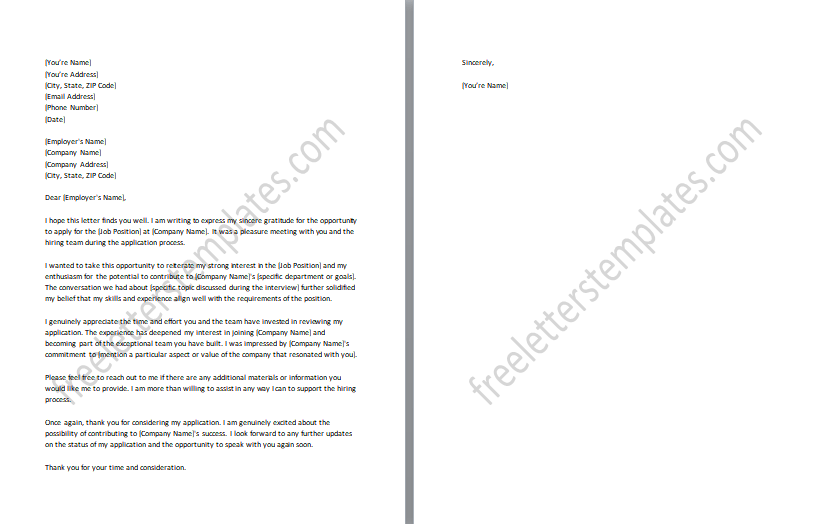
#2: Status Inquiry Follow-up Letter:
The Status Inquiry Follow-up Letter serves as a polite means to inquire about the status of your job application while also expressing your continued interest in the position. Its purpose is to seek an update on the hiring process, including whether a decision has been made or if any additional steps are required. By sending this letter, you demonstrate your proactive approach and eagerness to stay informed about the progress of your application. It also provides an opportunity to reiterate your enthusiasm for the role and reaffirm your qualifications. The letter helps to maintain a professional connection with the employer and shows your commitment to the application process.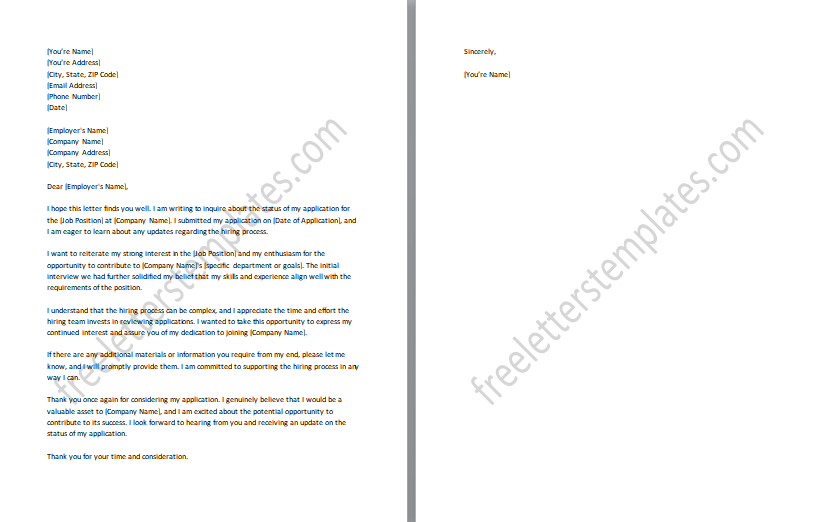
#3: Additional Documentation Follow-up Letter:
The Additional Documentation Follow-up Letter is utilized to submit supplementary documents or information that can bolster your job application. Its purpose is to provide the hiring manager or employer with additional evidence of your qualifications, skills, or experiences that were not included in the initial application. This letter aims to enhance your candidacy by offering relevant and compelling supporting materials, such as certifications, awards, portfolio samples, or references. By submitting these additional documents, you demonstrate your commitment to showcasing your capabilities and going the extra mile to strengthen your application.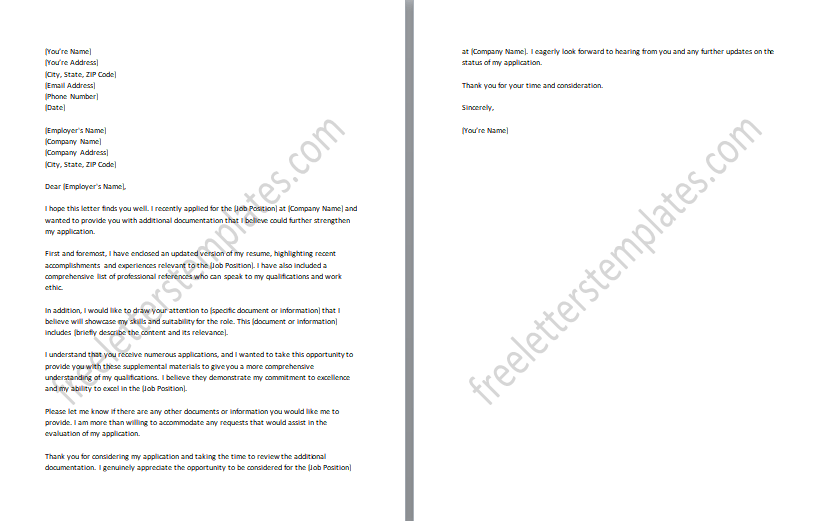
#4: Networking Follow-up Letter:
The Networking Follow-up Letter is an important communication tool used to express appreciation and provide an update to a professional contact who referred you to a job opportunity. Its purpose is to maintain and strengthen your professional relationship with the individual who played a role in connecting you with the job opening. Additionally, it provides an opportunity to update them on the progress of your application or any subsequent steps you have taken, such as interviews or additional networking opportunities. By sending this follow-up letter, you demonstrate your professionalism, gratitude, and commitment to nurturing your network connections. It also serves to keep your contact informed and engaged in your job search journey.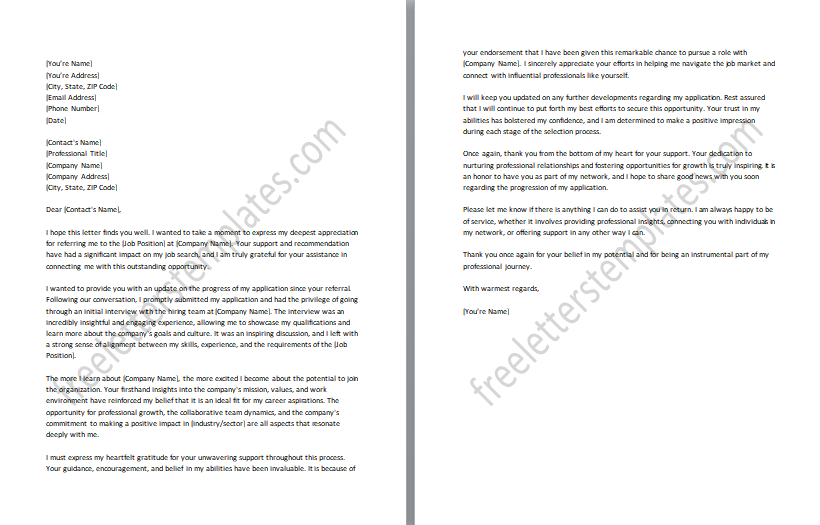
#5: Introduction Follow-up Letter:
The Introduction Follow-up Letter serves as a means to further introduce yourself and reiterate your qualifications to someone you met during the application process. Its purpose is to establish or strengthen a connection with the individual and leave a positive impression. This letter allows you to provide additional context about your background, skills, and experiences that may not have been covered extensively in your initial interaction. By sending this follow-up letter, you demonstrate your proactive approach, professionalism, and commitment to making a lasting impression. It provides an opportunity to highlight key qualifications, accomplishments, or relevant projects that showcase your suitability for the position. This letter aims to build rapport and increase the chances of being remembered and considered as a strong candidate.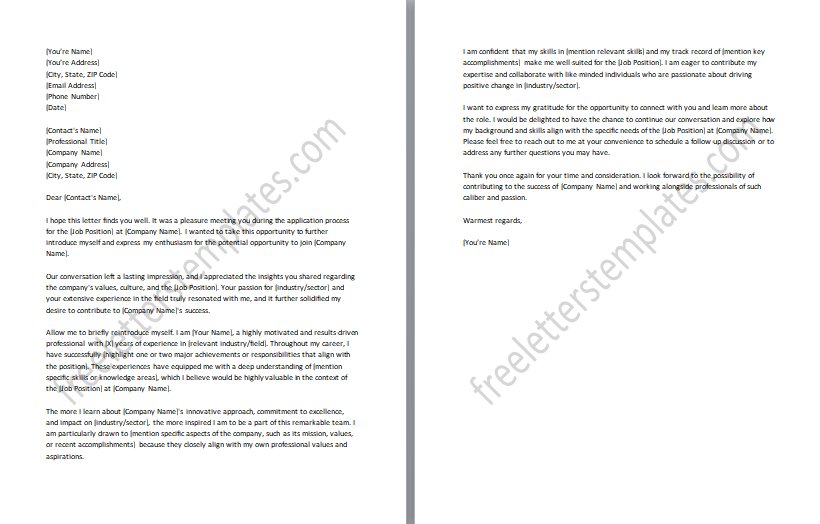
#6: Skills Highlight Follow-up Letter:
The Skills Highlight Follow-up Letter is a powerful tool to emphasize specific skills or experiences that are highly relevant to the job but may not have been thoroughly covered in your initial application. Its purpose is to draw attention to these key qualifications and highlight their alignment with the job requirements. This letter allows you to provide additional details, examples, or accomplishments that showcase your proficiency in these specific skills. By sending this follow-up letter, you demonstrate your proactive approach to addressing any potential gaps or areas that were not fully explored in your initial application. This letter aims to showcase your unique value proposition and expertise, distinguishing you as a highly qualified candidate.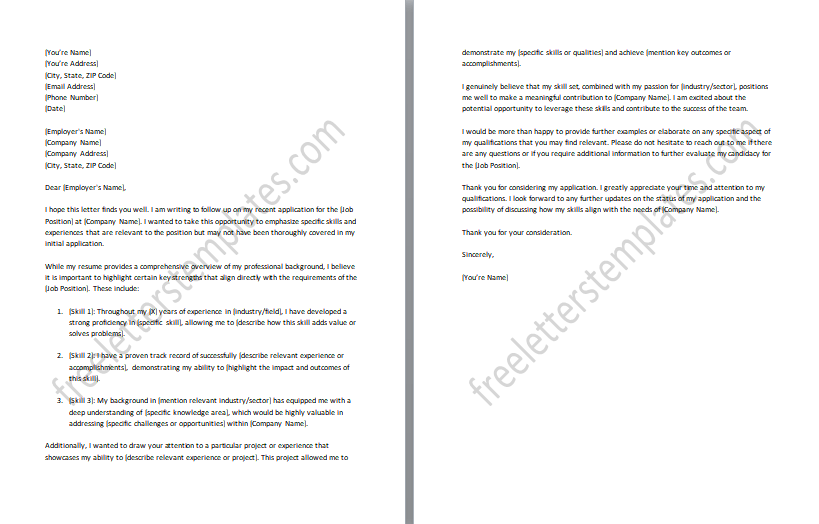
#7: Project Proposal Follow-up Letter:
The Project Proposal Follow-up Letter is a valuable tool to showcase your ideas and demonstrate your ability to contribute to specific projects or initiatives related to the job you have applied for. Its purpose is to provide a detailed proposal that outlines your approach, strategies, and potential contributions to the project. By sending this follow-up letter, you exhibit your proactive mindset, creativity, and problem-solving skills. It allows you to showcase your understanding of the job requirements and your ability to think critically and strategically. This letter aims to differentiate you from other candidates by offering tangible solutions and ideas that can bring value to the organization. It demonstrates your commitment to going above and beyond and provides the hiring manager with a glimpse into your potential contributions to the company’s success.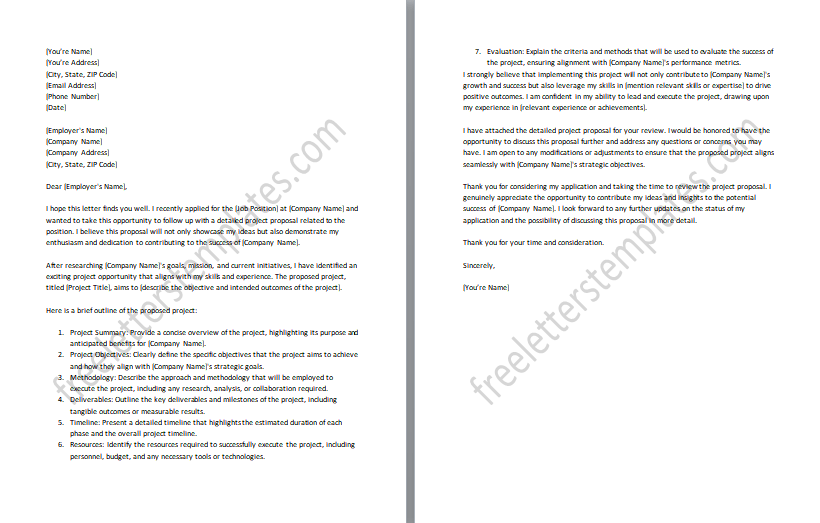
#8: Availability Follow-up Letter:
The Availability Follow-up Letter is an essential communication tool to confirm your availability for interviews or any additional steps in the hiring process. Its purpose is to ensure that both you and the employer are on the same page regarding scheduling and to demonstrate your professionalism and commitment to the process. By sending this letter, you provide clarity and avoid any potential scheduling conflicts or misunderstandings. It is an opportunity to express your flexibility and willingness to accommodate the employer’s preferred dates and times for interviews or any other necessary steps. This letter helps to maintain open lines of communication and shows your enthusiasm for progressing in the hiring process. It also reflects your reliability and organization skills, which are valued qualities in a prospective candidate.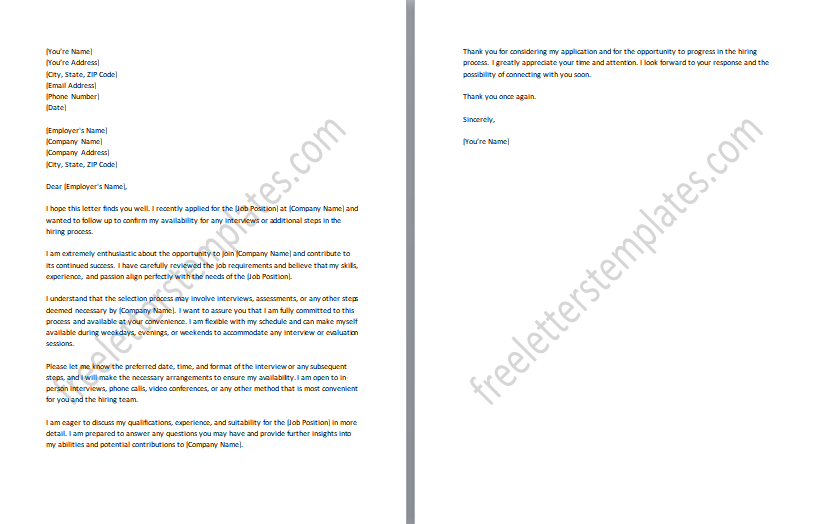
#9: Follow-up Letter After Interview:
The Follow-up Letter after Interview is a heartfelt opportunity to express your gratitude to the interviewer for giving you the chance to showcase your skills and qualifications. It’s a chance to convey your genuine appreciation for their time and consideration. By sending this letter, you can show your professionalism and sincere interest in the position. You have the chance to reiterate your enthusiasm for the role and emphasize how your unique qualifications align with the needs of the position. This follow-up letter helps you stay top-of-mind with the interviewer and serves as a friendly reminder of your dedication and excitement for the opportunity.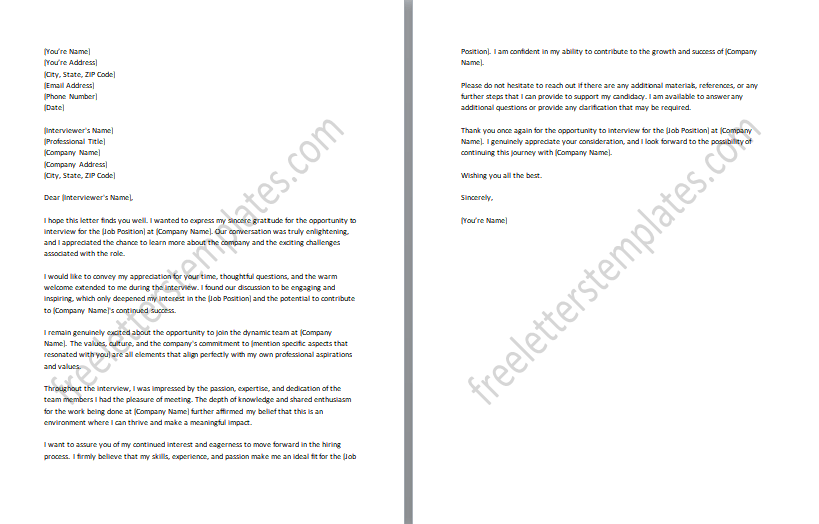
#10: Interview Recap Follow-up Letter:
The Interview Recap Follow-up Letter allows you to summarize the key points discussed during the interview and reinforce your qualifications for the position. Its purpose is to provide a concise recap of the interview conversation, showcasing your active listening skills and attention to detail. By sending this letter, you demonstrate your professionalism and the effort you put into understanding the company’s needs. It also provides an opportunity to highlight any additional qualifications or experiences that may not have been fully explored during the interview. This follow-up letter serves as a reminder to the interviewer of your relevant skills and qualifications, reinforcing your candidacy for the position. It helps to leave a lasting impression and further solidify your fit for the role.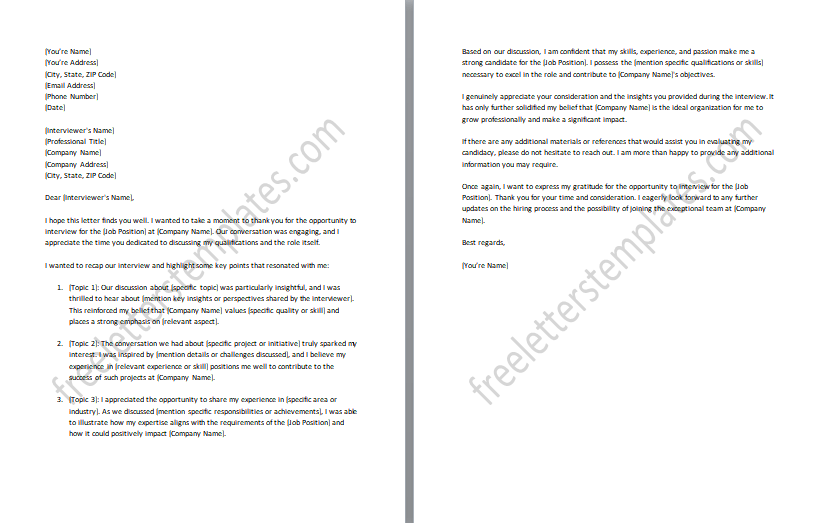
#11: References Follow-up Letter:
The References Follow-up Letter serves as a means to provide a list of professional references or offer to provide them upon request. Its purpose is to demonstrate your preparedness and willingness to provide credible references that can vouch for your skills and qualifications. By sending this letter, you show your commitment to presenting a comprehensive picture of your abilities and character. You can include the names, positions, and contact information of individuals who can speak positively about your work ethic, accomplishments, and character traits relevant to the job. This follow-up letter provides reassurance to the employer that you have a strong network of supporters who can validate your suitability for the position. It also demonstrates your proactive approach and readiness to provide additional information upon their request.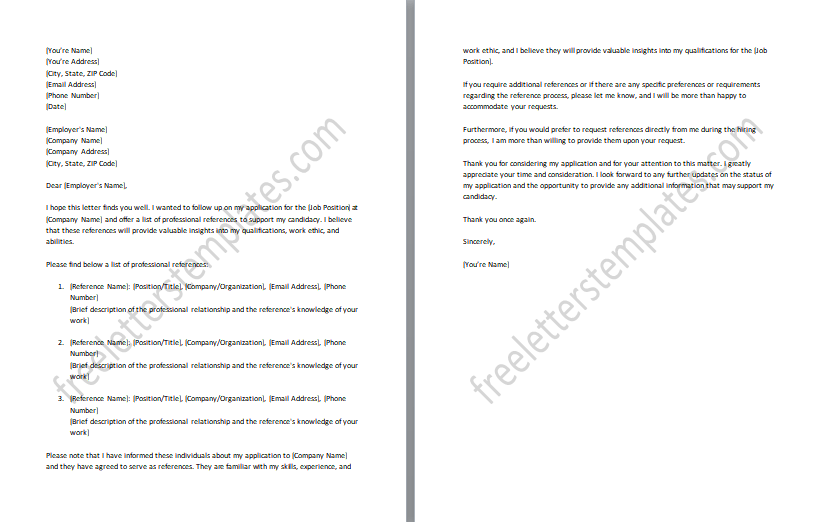
#12: Salary Negotiation Follow-up Letter:
The Salary Negotiation Follow-up Letter is a valuable tool to further discuss your salary expectations or counter an offer as part of the negotiation process. Its purpose is to open a constructive dialogue with the employer regarding compensation and ensure that your financial needs align with the value you bring to the position. By sending this letter, you demonstrate your confidence and assertiveness in advocating for your worth. It provides an opportunity to discuss any relevant factors that support your desired salary, such as your qualifications, experience, or market research on industry standards. This follow-up letter aims to reach a mutually beneficial agreement that recognizes your contributions while considering the employer’s budgetary constraints. It showcases your professionalism and ability to communicate effectively in sensitive matters, ultimately helping to establish a solid foundation for a successful working relationship.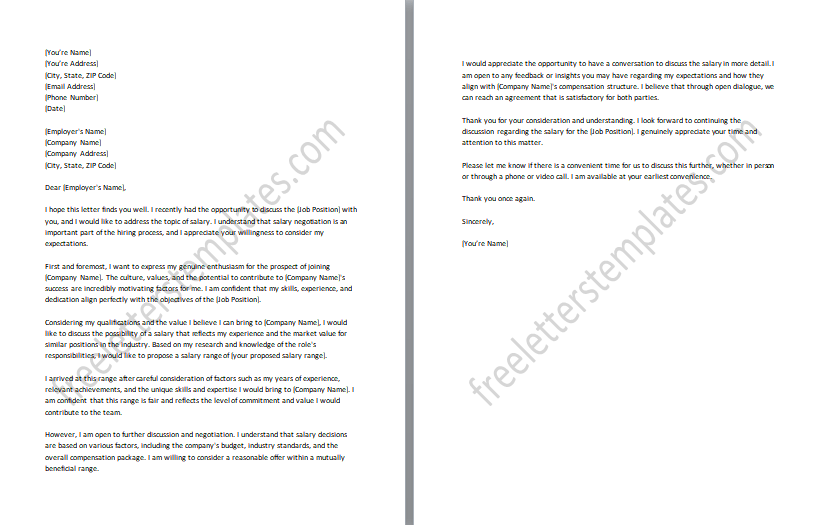
#13: Second Interview Request Follow-up Letter:
The Second Interview Request Follow-up Letter is a proactive approach to request a second interview if you believe it would provide an opportunity to further showcase your qualifications and suitability for the position. Its purpose is to express your continued interest in the role and highlight your enthusiasm for advancing in the selection process. By sending this letter, you demonstrate your eagerness to further engage with the hiring team and convey your confidence in your ability to contribute to the organization. It provides an opportunity to address any additional questions or concerns that may have arisen during the initial interview and present further evidence of your qualifications. It showcases your proactive and determined approach to securing the role while also reinforcing your commitment to the selection process.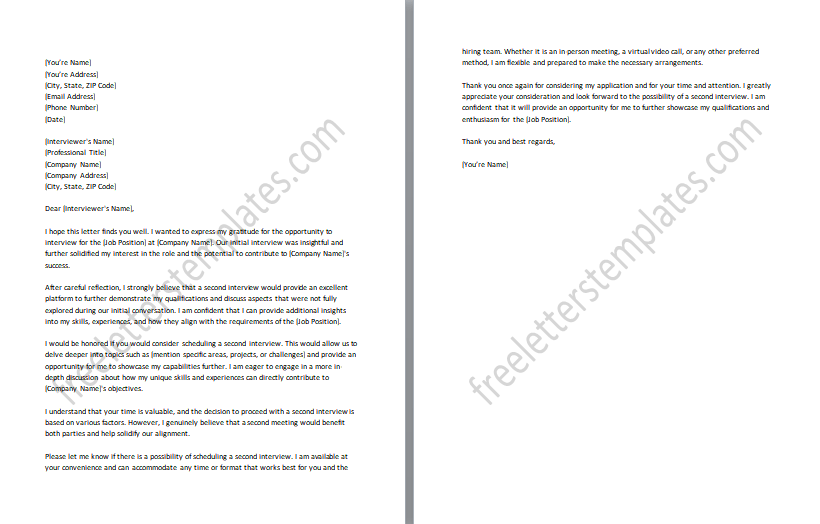
#14: Follow-up Letter for Rejection:
The Follow-up Letter for Rejection is a gracious and tactful way to express your appreciation for the consideration given to your application, despite not being selected for the position. Its purpose is to maintain a positive relationship with the employer and seek constructive feedback to enhance your future prospects. By sending this letter, you demonstrate your professionalism and gratitude for the opportunity to be considered as a candidate. It allows you to express your continued interest in the organization and your commitment to self-improvement. Additionally, it provides an opportunity to request feedback on areas where you can enhance your qualifications or application materials. It reflects your humility, openness to learning, and determination to continually improve as a candidate.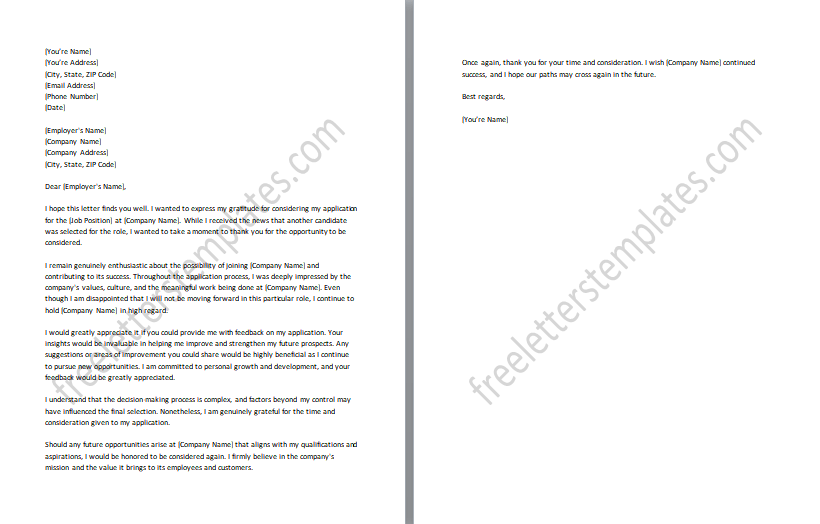
#15: Application Withdrawal Follow-up Letter:
The Application Withdrawal Follow-up Letter is a professional way to inform the employer that you are withdrawing your application for a specific position due to accepting another job offer. Its purpose is to maintain a respectful and courteous relationship with the employer while providing them with updated information about your availability. By sending this letter, you demonstrate your integrity and commitment to open and honest communication. It allows you to express your gratitude for the consideration given to your application and convey your appreciation for the opportunity to be considered for the position. This follow-up letter aims to leave a positive impression and maintain a positive professional connection with the employer, as they may have future opportunities that align with your career goals.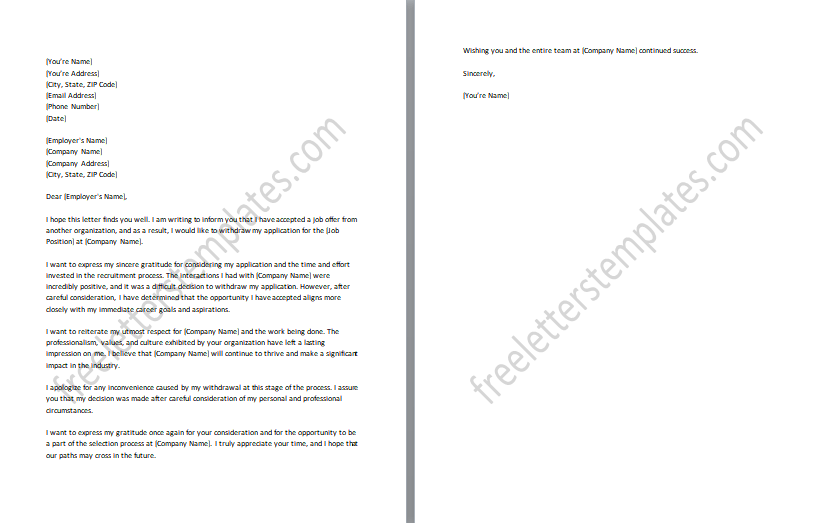
#16: Post-Training Follow-up Letter:
The Post-Training Follow-up Letter is a valuable tool to showcase the knowledge and skills you have gained after attending a training or workshop. Its purpose is to express gratitude to the organizers for providing the opportunity and to highlight the key takeaways from the training. By sending this letter, you demonstrate your commitment to continuous learning and professional development. It allows you to showcase how the training has positively impacted your knowledge, skills, and understanding in the relevant field. This follow-up letter provides a platform to share specific examples of how you have applied the newly acquired knowledge in your work or personal projects. It can also serve as a networking opportunity by expressing interest in future training events or maintaining a relationship with the trainers and fellow attendees.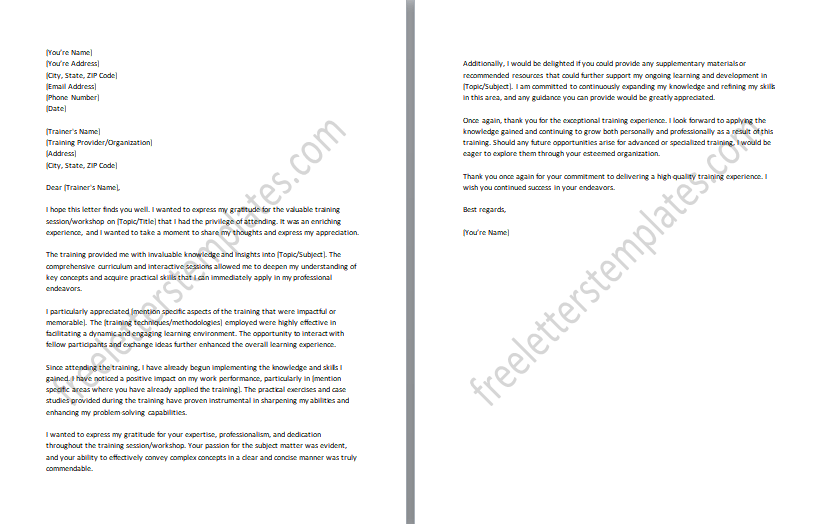
#17: Job Fair Follow-up Letter:
The Job Fair Follow-up Letter is an effective way to maintain contact with employers you met at a job fair, expressing your continued interest in their organization and providing any requested materials. Its purpose is to establish a connection beyond the initial encounter and demonstrate your proactive approach to the job search process. It allows you to reiterate your interest in the company and emphasize how your skills and qualifications align with their needs. Additionally, if any employers requested specific materials, such as a resume or portfolio, this follow-up letter serves as an opportunity to provide them promptly. It showcases your professionalism, attention to detail, and organizational skills, leaving a positive impression on employers. This letter aims to keep the lines of communication open and increase the chances of further engagement or potential job offers in the future.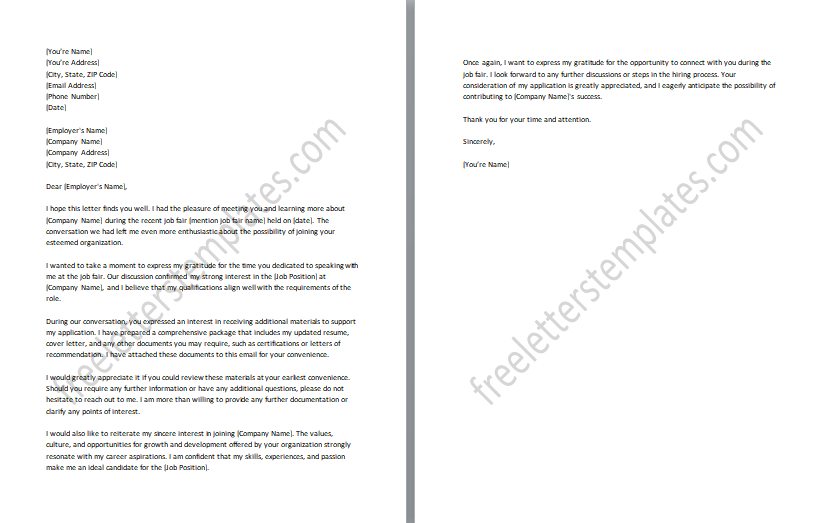
#18: Company Research Follow-up Letter:
The Company Research Follow-up Letter provides an opportunity to share additional research or insights you have gathered about the company since submitting your application. Its purpose is to demonstrate your continued interest and dedication to understanding the organization and its goals. By sending this letter, you show your proactive approach to staying informed and engaged with the company’s developments. It allows you to highlight specific aspects of the company that align with your values, skills, or career aspirations. It demonstrates your ability to go above and beyond in your research efforts, positioning you as a highly informed and motivated candidate.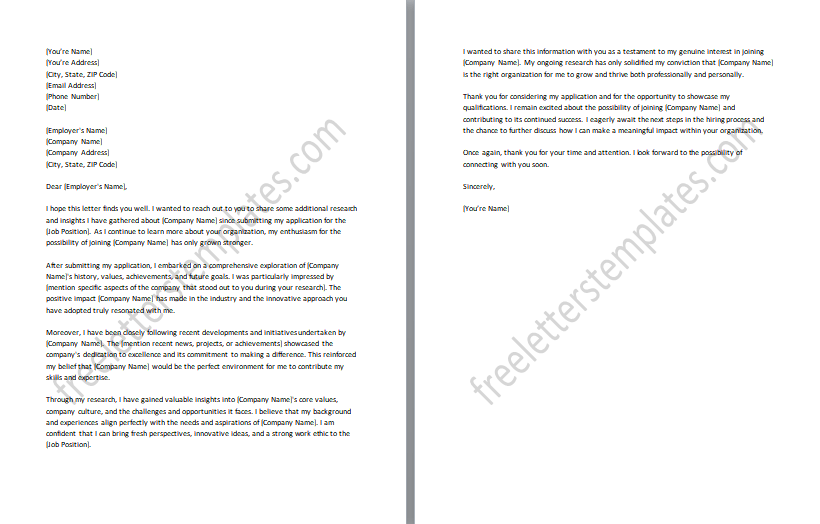
#19: Request for Portfolio/Work Samples Follow-up Letter:
The Request for Portfolio/Work Samples Follow-up Letter provides an opportunity to offer your portfolio or work samples to showcase your abilities in greater detail. Its purpose is to demonstrate the depth and quality of your work, allowing the employer to gain a comprehensive understanding of your skills and capabilities. By sending this letter, you show your proactive approach in providing additional evidence of your qualifications beyond what is included in your initial application. It allows you to highlight specific projects, achievements, or outcomes that align with the requirements of the position. Additionally, you can emphasize how your work samples directly relate to the needs and goals of the company. It reflects your confidence in your work and your desire to provide the employer with a comprehensive understanding of your capabilities.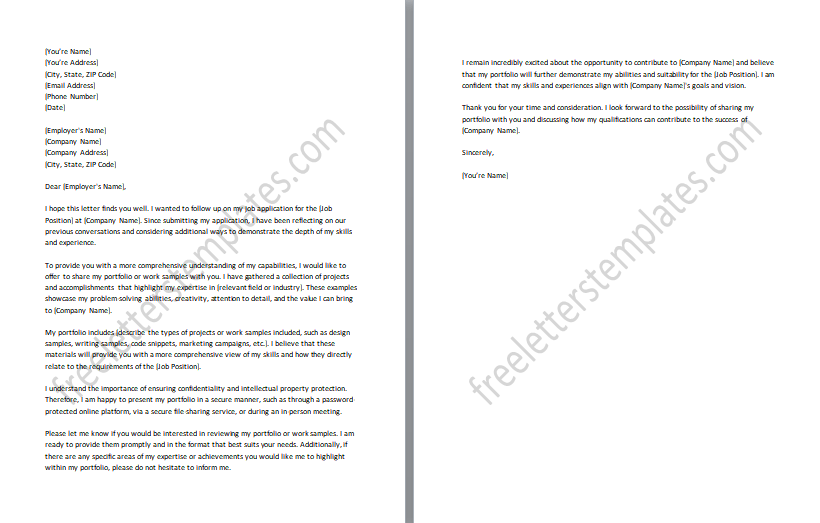
#20: Follow-up Letter for Internal Applications:
The Follow-up Letter for Internal Applications serves as a means to express your interest in an internal job opening within your organization and highlight your relevant qualifications. Its purpose is to communicate your enthusiasm for the opportunity to advance within the company and showcase your suitability for the position. By sending this letter, you demonstrate your proactive approach to pursuing growth and development within your current workplace. Additionally, you can highlight your previous accomplishments, experiences, and skills that directly align with the requirements of the internal position. It reflects your ambition, loyalty, and readiness to take on new challenges within the organization.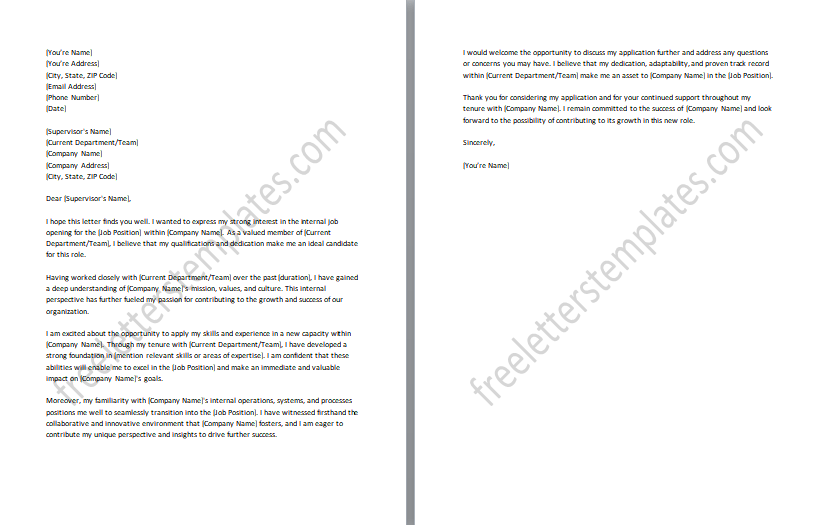
#21: Travel or Relocation Assistance Follow-up Letter:
The Travel or Relocation Assistance Follow-up Letter is a communication to discuss the logistics and potential assistance related to travel or relocation required for the job. Its purpose is to address any concerns or questions regarding the process and demonstrate your willingness to navigate the necessary arrangements. By sending this letter, you show your proactive approach to ensuring a smooth transition and highlighting your commitment to fulfilling the job requirements. This follow-up letter aims to establish open and transparent communication, showcasing your flexibility, adaptability, and eagerness to join the organization. It reflects your readiness to embrace new experiences and demonstrates your commitment to making a successful transition to the new location.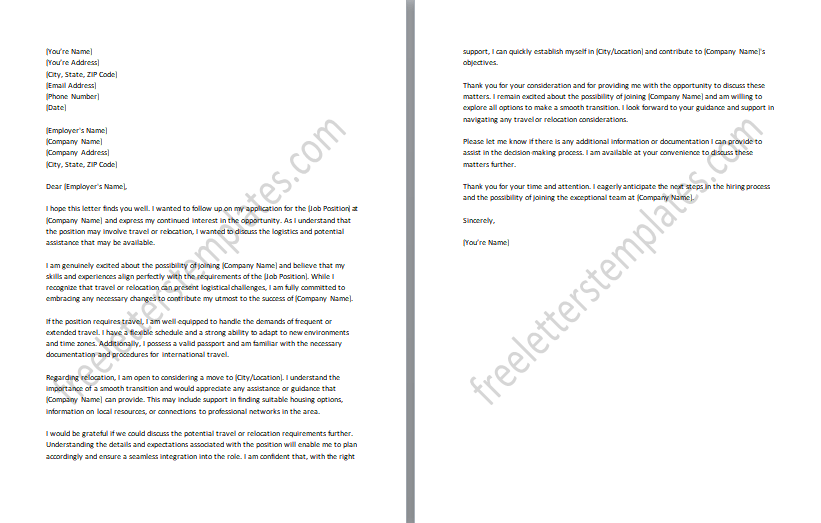
#22: Department-Specific Follow-up Letter:
The Department-Specific Follow-up Letter is tailored to a specific department, demonstrating your alignment with their goals. It highlights your understanding of their unique challenges and showcases how your skills can contribute to their success. By expressing genuine interest in their work, you convey your commitment to becoming a valuable asset. Emphasizing relevant experiences, achievements, or projects, you align your qualifications with their needs. This letter establishes a connection, reflecting your enthusiasm and expertise. It communicates your readiness to meaningfully contribute to their objectives and become an integral part of their team.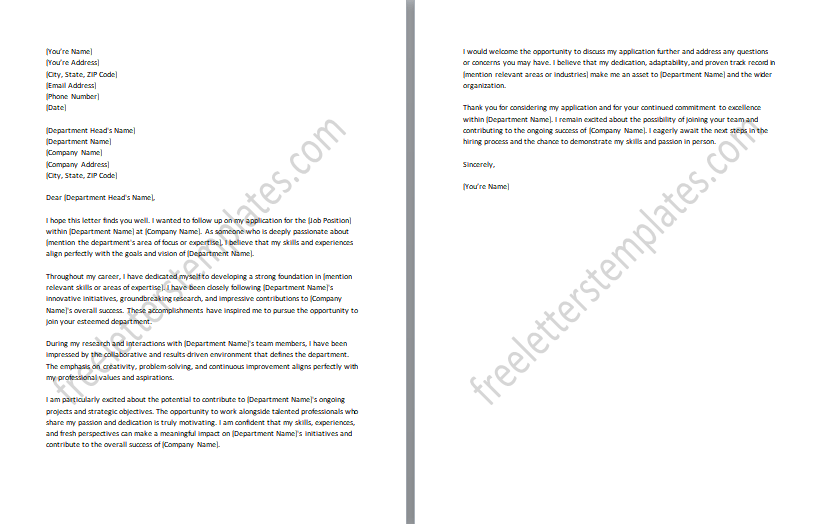
#23: Project Status Update Follow-up Letter:
The Project Status Update Follow-up Letter is a communication sent to provide an update on the progress of ongoing projects related to the job. Its purpose is to keep stakeholders informed and demonstrate your proactive approach to keeping them updated on the status of the projects. By sending this letter, you showcase your professionalism, accountability, and commitment to delivering results. It allows you to outline key milestones achieved, highlight any challenges faced, and provide a timeline for future progress. Additionally, you can share insights or recommendations that may improve project outcomes. This follow-up letter aims to foster effective communication, build trust, and assure stakeholders of your dedication to project success. It reflects your ability to manage projects efficiently and effectively collaborate with team members to achieve desired outcomes.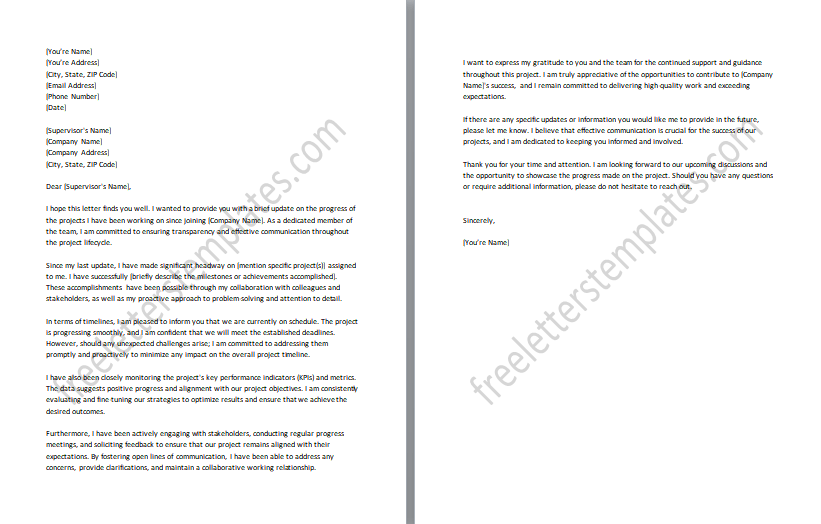
#24: Social Media Follow-up Letter:
The Social Media Follow-up Letter involves connecting with the hiring manager or company representative on professional networking platforms, such as LinkedIn, and sending a follow-up message. Its purpose is to establish a digital connection and further engage with the individuals involved in the hiring process. By reaching out through social media, you demonstrate your active participation in professional networks and your interest in building a professional relationship. It provides an opportunity to express your gratitude for the opportunity to apply, reiterate your interest in the position, or share additional relevant information.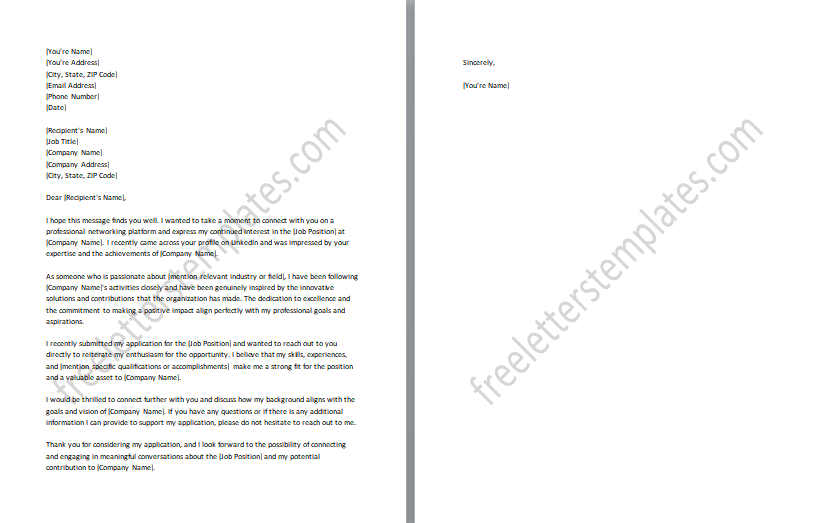
#25: Mentorship or Shadowing Request Follow-up Letter:
The Mentorship or Shadowing Request Follow-up Letter expresses your interest in a mentorship or shadowing opportunity to gain deeper insights into the role or industry. Its purpose is to demonstrate your enthusiasm for learning and your commitment to professional growth. It allows you to highlight the specific areas or skills you wish to develop and how the mentorship or shadowing opportunity will contribute to your personal and professional development. Additionally, you can express your gratitude for the potential mentor’s time and expertise, and outline any specific goals or expectations you have for the mentorship or shadowing experience. This follow-up letter aims to establish a meaningful connection and foster a supportive learning environment. It reflects your dedication to continuous improvement and your eagerness to learn from seasoned professionals in the field.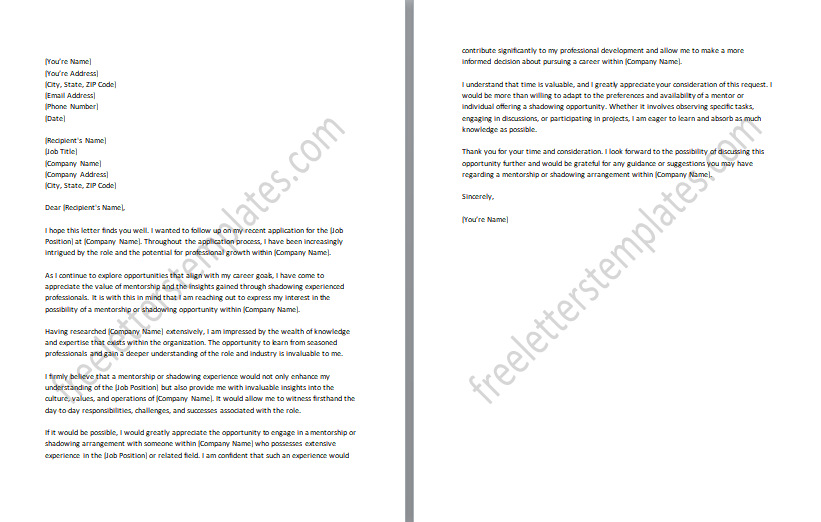
Tracking and Organization
Tracking and organizing follow-up letters is essential to stay organized and effectively managing your communication with potential employers.
- Set reminders or calendar events: Utilize calendar or reminder apps to set alerts for important follow-up dates, such as when to send a thank-you note after an interview or when to check on the status of your application. This helps you stay proactive and ensures you don’t miss any crucial follow-up opportunities.
- Use email folders or labels: Create dedicated folders or labels in your email account to organize follow-up emails. Categorize them based on the stage of the application process or the purpose of the follow-up (e.g., interview follow-up, application status inquiries). This allows for easy access and reference when needed.
- Maintain a centralized document repository: Keep copies of all your follow-up letters, along with any relevant documents or attachments, in a centralized location such as a dedicated folder on your computer or cloud storage service. This ensures that you can easily retrieve and refer to them when necessary.
- Follow-up timeline: Establish a timeline for your follow-up activities. Determine the appropriate intervals between follow-ups based on the specific situation (e.g., waiting a week after an interview to send a thank-you note). Having a structured timeline helps you stay organized and ensures you’re following up at the right times.
- Document outcomes and responses: Record any responses or outcomes from your follow-up letters. Note any follow-up actions required, such as scheduling additional interviews or submitting additional documents. This helps you keep track of the progress and next steps in the hiring process.
Professional Branding
Maintaining consistent professional branding across all follow-up communications is crucial for establishing a strong and cohesive image. Your follow-up letters, email signatures, formatting, and language collectively contribute to how you are perceived by potential employers. Consistency in branding demonstrates professionalism, attention to detail, and a clear understanding of your personal identity and values. By using consistent formatting, such as using the same font, font size, and color scheme, you create a visually cohesive impression. Additionally, ensure that your email signature includes relevant contact information, such as your name, phone number, and professional social media profiles, reinforcing your professional identity. When it comes to language, use a consistent tone and style that aligns with your personal brand. Whether it’s being formal, friendly, or a combination, maintaining consistency showcases your professionalism and builds credibility. Consistent branding across follow-up communications helps create a memorable and cohesive impression, strengthening your professional image and making you stand out in the minds of potential employers.
Conclusion:
In conclusion, follow-up letters play a vital role in the job application process, allowing you to maintain communication, express gratitude, and highlight your qualifications. By personalizing your letters, adhering to professional communication etiquette, tracking and organizing your follow-up efforts, and maintaining consistent professional branding, you can enhance the impact of your follow-up communications. These strategies not only demonstrate your professionalism, attention to detail, and enthusiasm for the opportunity but also help you stand out among other applicants. Remember, each follow-up letter is an opportunity to leave a positive and lasting impression, showcasing your commitment and dedication to securing the position. With a well-crafted follow-up approach, you can increase your chances of success and build stronger connections with potential employers.